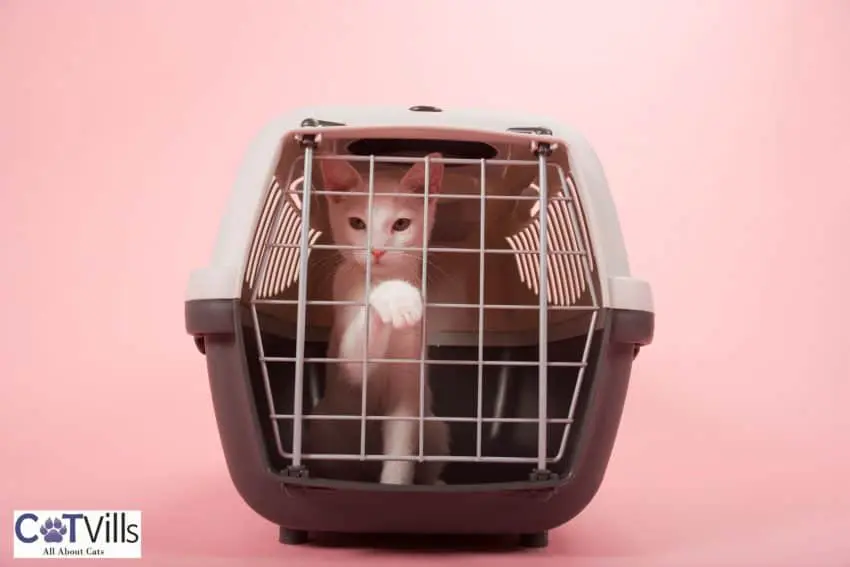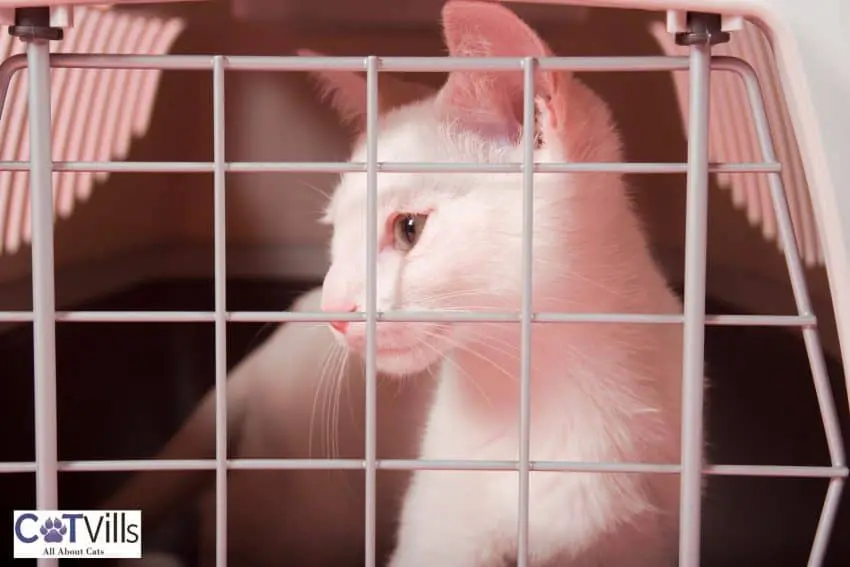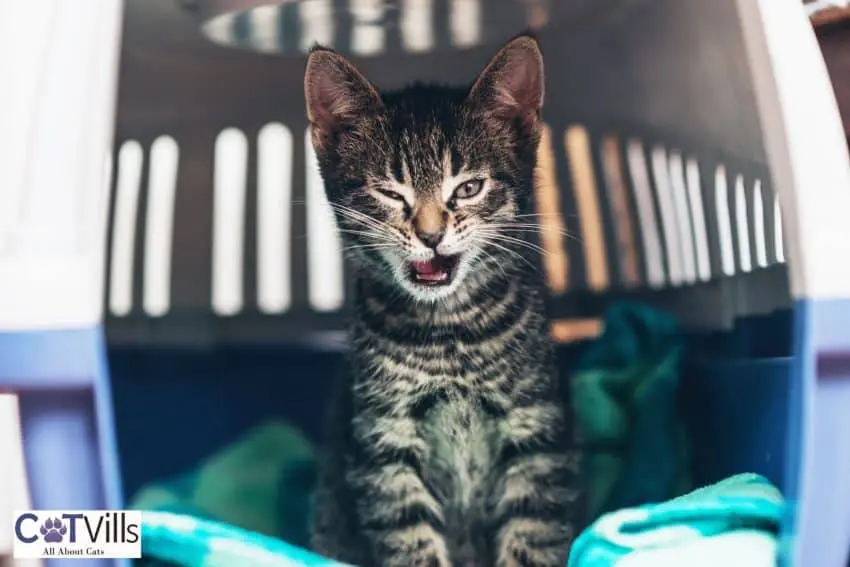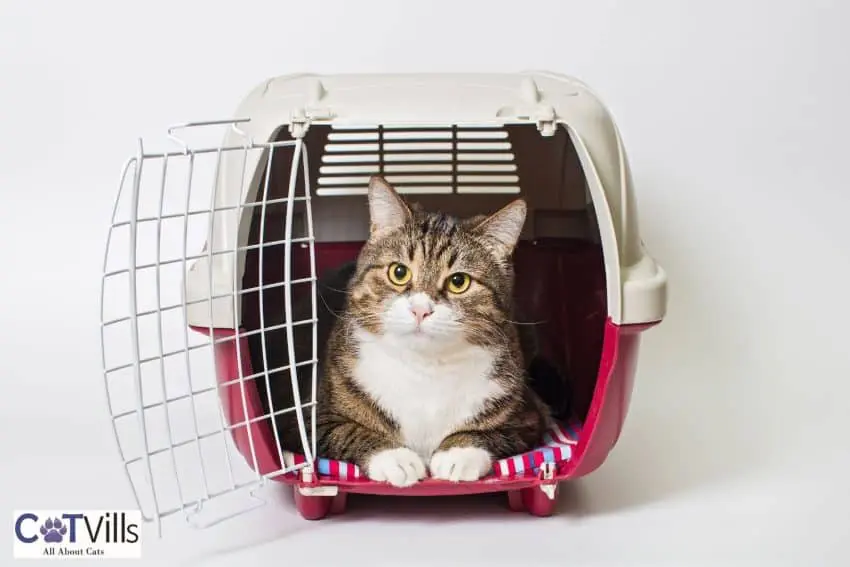Last Updated: 1 year ago
Are you thinking about crating a cat at night to keep your feline friend from making a mess around the house?
As you’re going to find out, crating your cat isn’t inhumane, as many cat owners think, and can be an excellent solution to some behavioral and medical issues.
So, I’m here to talk about everything pet owners should know about putting a cat in a crate at night.
Just keep reading.
Crating a Cat at Night: 11 Reasons Why You Should Do It
Cats are free-spirited animals that like to roam at night and pull all kinds of crazy stunts while you’re sleeping. They don’t take well to sleeping in a cage at night.
And as a study points out, “the confinement of cats in homes or other environments may lead to poor welfare through inadequate environments that do not meet the needs of cats.”
So, should you be crating a cat at night? Crating can benefit kittens until they get used to their new home and stop hiding under the bed or furniture.
But well-adjusted adult cats shouldn’t sleep in a crate at night unless there’s an excellent reason for restricting your kitty’s movement.
Still, let’s talk about when you should consider crating a cat at night.
1. To Protect Your Cat

Cats are fond of small spaces, not missing the chance to sneak inside a box, a wardrobe, or a cupboard. That’s because they feel safe, and it’s easy to defend themselves from potential attacks.
As such, you can place your cat in a cage to calm them down or prevent them from running away or hurting themselves.
Sometimes crating a cat at night is necessary when you have guests and are afraid someone will let your cat loose.
Still, not all cats consider the cage a safe space, and being confined can make them even more anxious and lead to mental issues.
2. To Tame a Feral Cat
You can’t let a feral animal loose inside the house because it will run away through the first open window or door.
So, a cat crate is excellent for taming feral kitties and starting the socialization process.
While the wild cat won’t be pleased about being in a cage, it’s better for them in the long run.
3. To Help Your Kitty Adjust

You can’t leave a new cat loose around the house unless you want to spend a couple of days checking all the nooks and crannies looking for your hiding cat.
So, should kittens sleep in a crate? During the first few days, you can let your kitty sleep in a crate to ease their stress and allow them to get used to the new environment and people.
Crating is also an excellent solution to ensure your kitten won’t get into any trouble at night or when you’re not around to supervise them.
4. To Quarantine
Finally, it’s acceptable to use a cat cage to quarantine your kitty for a short period of time.
Usually, it’s something you do with new cats to ensure they are no health issues, such as parasites, skin irritation, snotty noses, etc.
But crating a cat at night can also be necessary when there’s an outbreak of a disease in your household, and you want to keep the animals separated.
5. After Surgery Or Injury

Usually, cats are very stressed during the first few days after surgery. They are groggy from the sedative and many are very scared.
Vet specialists say, “It is essential to avoid running, jumping, and other strenuous activity that could cause excessive strain on the wound.”
Caging your cat ensures your pet won’t tear its stitches, suffer a bad fall, or hide somewhere you can’t keep an eye on its recovery.
And you can check if your cat is eating its dry food and that all of its bodily functions are working normally, especially in a multi-cat household.
So, it’s acceptable to crate your cat to limit their movements until your feline friend is better or has recovered from their injuries.
Talk to your vet about the appropriate amount of time to keep your cat inside the cage, and don’t forget to provide a food and water bowl.
6. When Sick

Cats are generally healthy animals, but they get sick from time to time. And dealing with a sick cat can be a challenge when you have to administer medication.
So, crating a cat at night when sick serves a double purpose. You can keep a close eye on your feline friend, and you don’t have to look for their hiding place when it’s medicine time.
Moreover, crating a cat at night can help you determine which cat is unwell when you’ve got multiple felines or easily collect urine and feces samples for testing.
7. To Prevent Litter Box Accidents

Most cats quickly learn how to use the litter box and never fail to do so unless they’re sick or you’ve forgotten to clean the toilet.
Still, some young kittens need cat litter box training, and keeping them in a crate at night with their litter box can speed up the process.
That’s because cats are one of the cleanest animals, so they’ll opt to use the provided litter tray instead of soiling their bedding.
Still, you should make a vet appointment if you notice any sudden bathroom changes in your cat since inappropriate elimination can be related to a medical issue, such as a UTI.
8. To Reduce Bullying Behavior
As an experienced cat owner, I’ve often seen cats bully each other over food, territory, and toys.
And I don’t recommend letting cats work it out on their own because it makes the problem worse.
So, it’s better to restrict the bullied cat to another room or crate the cat at night to prevent bullying attempts while you’re sleeping and can’t interfere.
9. To Introduce a New Cat

While cats can learn to get along with each other, it’s not something that happens overnight.
You need to introduce the new cat slowly and keep conflicts to a minimum.
That’s why a crate can be an excellent solution to introducing new cats into the household.
It allows the animals to meet and sniff each other without the possibility of a fight.
10. To Teach Your Cat a Lesson
When your cat is misbehaving, some pet parents recommend that you crate your kitty for a short period of time to train it to behave.
In these circumstances, crating your cat gives your pet time to cool down and teaches your kitty that actions have consequences.
11. To Resolve Breeding Issues

Breeders often use a special breeding cage to ensure successful mating between cats when breeding in an open area doesn’t work.
And if you have unaltered males and intact females, you may want to keep one party in a cage until the female heat is over to avoid unwanted pregnancy.
Of course, spaying or neutering your felines is a better alternative to caging since it’s beneficial for your pet in the long run.
Crating Cats at Night: 5 Reasons You Shouldn’t Do It
While cats have the reputation of being aloof, they’re social animals.
That’s why you can’t just lock your cat in a cage when it’s not behaving as you expect it to or if it interferes with your normal life.
So, here are 5 situations when you shouldn’t cage your cat at night.
1. When You Have a Noisy Cat

It’s no use crating a cat at night to keep it quiet because an unhappy feline will meow all night long and attempt to escape the cage.
Many cats cry for attention at night because they’re bored and full of energy. So, it’s better to spend time during the day tiring your kitty instead of using a crate.
2. When You Want to Avoid Sleep Disturbances
If you don’t want your cat to keep you up at night with its activities, you shouldn’t let your cat sleep with you from the beginning.
It’s cruel to keep your cat in a cage during the night because you want to get your beauty sleep. Cats need to burn off their energy, or they can get depressed and sick.
Jackson Galaxy has some great tips for cat parents on how to train their furry friends to let you sleep.
3. When You’ve Got an Anxious Cat
As cat experts say, “Don’t try to put your cat into a carrier when they are anxious, as not all cats calm down when crated.”
Moreover, if your cat is freaked out, the chances are minimal that they will enter the crate without a fight. And that’s only going to damage the bond with your pet.
4. When You Haven’t Introduced the Crate
You can’t crate a cat at night without introducing the crate in a positive manner. Your cat or kitten should consider it a comfortable space to spend time and not fear being locked inside.
Moreover, you have to pick a type of crate suitable for your cat; it should be big enough to fit your cat, its water and food bowls, and a litter box.
Cat trainer Mikkel Becker gives cat parents some tips on how to crate train in this video.
5. When You Haven’t Crate-Trained Your Cat
Unless you want your kitty to freak out the first time you lock them in a crate, you should crate train them beforehand.
Crate training a kitten at night is simple:
- Coax your kitten to come inside the crate with treats and tasty food without closing the door.
- When your kitty is comfortable in the crate, close the door for a minute.
- Let your cat out and reward them for good behavior.
- Increase the duration of time your cat spends locked in the crate.
FAQs
HOW TO PUT A CAT TO SLEEP AT NIGHT?
To put your cat to sleep at night, keep it awake as much as possible during the day. In the evening, play with your cat before going to bed, and feed it a small meal. That should be enough to keep your kitty asleep for 5-6 hours.
HOW LONG CAN A CAT STAY IN A CRATE?
You can let your cat stay in a crate for about 6 hours on average. It’s not good to keep the cat or kitten confined for longer periods because it can lead to a behavioral issues.
CAN I KEEP MY CAT IN A CAGE WHILE AT WORK?
You can crate your cat while at work, but you should ensure the crate is comfortable and your cat has access to water, food, and toys. But it should be a last resort since cats can get depressed if confined for too long.
Conclusion
It’s not cruel to crate a cat at night when you have a reason for restricting your cat’s movement or want to keep them safe.
But no cat will enjoy a life spent in a cage, no matter how much you spoil it.
As such, you should crate your kitty only when absolutely necessary and not use the cat cage to keep your pet away because it’s bothering you.
What do you think about crating a cat at night? Do you crate your kitty at night? Share your experience with us in the comment section.
Resources:

